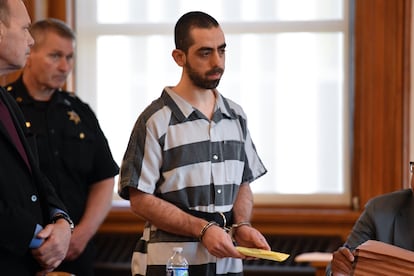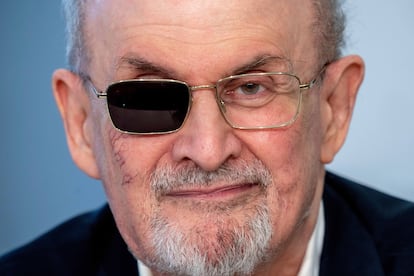Salman Rushdie attacker sentenced to 25 years in prison
Hadi Matar receives the maximum sentence in his first trial, but also faces terrorism-related charges


Hadi Matar, the 27-year-old man who attempted to kill writer Salman Rushdie in New York in 2022, was sentenced Friday to 25 years in prison by a judge in Chautauqua County Court in New York State, near the scene of the attack. Matar, whose knife attack left the author blind in one eye, was found guilty by a jury last February after less than two hours of deliberation. The sentence imposed is the maximum he faced at trial.
The same jury also found Matar guilty of assault for wounding Henry Reese, the event’s host, who was sitting next to the writer and tried to stop the attack. The judge sentenced him to seven years in prison for that crime, but the sentence runs concurrently, so the length of his term is not affected. Matar also awaits trial on terrorism-related charges.
Rushdie did not attend the sentencing hearing Friday, although he was the main witness during seven days of testimony, during which he described the assassination attempt in great detail, as well as his long and painful recovery.
Before being sentenced, Matar stood up in the courtroom and made a statement about freedom of expression, calling Rushdie a hypocrite, according to the Associated Press. “Salman Rushdie wants to disrespect other people,” said Matar, dressed in a white-striped prison uniform and handcuffed. “He wants to be a bully, he wants to bully other people. I don’t agree with that.”
On the morning of August 12, 2022, Matar abruptly burst onto the stage of the Chautauqua Institution, where Rushdie, seated in a semicircle with other participants, was to give a lecture specifically on the refuge and safety of persecuted writers. The assailant stabbed the dual British-American writer more than a dozen times in front of the audience. The attack left the 77-year-old novelist blind in his right eye and also injured the tendons of his left hand, which he used to defend himself.
Video of the attack, captured by the court’s cameras and played during the trial, shows Matar approaching the seated Rushdie from behind and reaching around him to stab him in the torso with a knife. As the audience screams and gasps, the writer is seen raising his arms and rising from his seat, walking and staggering a few steps with Matar hanging from him, swinging and stabbing him until they both fall to the ground and are surrounded by onlookers who rush to separate them.

In seeking the maximum sentence, District Attorney Jason Schmidt told the judge that Matar “designed the attack to cause the greatest possible harm, not just to Mr. Rushdie, but to the entire community, to the 1,400 people who were there to see him.” Defense attorney Nathaniel Barone noted that Matar had no prior criminal record and questioned whether members of the public should be considered victims, suggesting that a 12-year sentence would be appropriate.
Rushdie spent 17 days in a Pennsylvania hospital and more than three weeks in a New York City rehabilitation center. The writer detailed his recovery in his 2024 memoir, Knife.
Khomeini’s fatwa
Matar now faces federal trial on terrorism-related offenses. Authorities said Matar, a U.S. citizen, was attempting to comply with a decades-old fatwa, or edict, issued by Ayatollah Ruhollah Khomeini calling for Rushdie’s death for publishing his novel The Satanic Verses, which some Muslims consider blasphemous. Rushdie spent nine years in hiding, but after Iran announced it would not enforce the decree, he began appearing in public over the past quarter-century.
Matar, a Shia like the ayatollahs who rule Iran and issued the fatwa against Rushdie, has also been investigated for his alleged ties to the Lebanese party-militia Hezbollah, which is listed as a terrorist organization by the United States and the European Union. According to an indictment unsealed last July, in addition to the charges on which he was convicted, Matar was charged in federal court with providing material support to Hezbollah. During the trial, the young man erupted in harangues against Israel and called it a murderous state.
Matar traveled from his home in Fairview, New Jersey, to attack Rushdie at his summer residence, about 70 miles southwest of Buffalo. Matar believed the fatwa, first issued in 1989, was backed by Hezbollah and endorsed in a 2006 speech by the group’s assassinated former secretary-general, Hassan Nasrallah, according to federal prosecutors.
Matar pleaded not guilty to three counts of providing material support to terrorists, attempting to provide material support to Hezbollah, and participating in terrorist acts that crossed national borders.
Sign up for our weekly newsletter to get more English-language news coverage from EL PAÍS USA Edition
Tu suscripción se está usando en otro dispositivo
¿Quieres añadir otro usuario a tu suscripción?
Si continúas leyendo en este dispositivo, no se podrá leer en el otro.
FlechaTu suscripción se está usando en otro dispositivo y solo puedes acceder a EL PAÍS desde un dispositivo a la vez.
Si quieres compartir tu cuenta, cambia tu suscripción a la modalidad Premium, así podrás añadir otro usuario. Cada uno accederá con su propia cuenta de email, lo que os permitirá personalizar vuestra experiencia en EL PAÍS.
¿Tienes una suscripción de empresa? Accede aquí para contratar más cuentas.
En el caso de no saber quién está usando tu cuenta, te recomendamos cambiar tu contraseña aquí.
Si decides continuar compartiendo tu cuenta, este mensaje se mostrará en tu dispositivo y en el de la otra persona que está usando tu cuenta de forma indefinida, afectando a tu experiencia de lectura. Puedes consultar aquí los términos y condiciones de la suscripción digital.








































